Organizational Learning and Change: Barriers and Strategies Essay
VerifiedAdded on 2023/01/24
|7
|2121
|98
Essay
AI Summary
This essay delves into the concept of organizational learning, defining it as the process of retaining, creating, and sharing knowledge within an organization to drive group action and innovation. The essay identifies key barriers to organizational learning in India, such as lack of direct management, resistance to change, emphasis on individual achievement over team success, and a lack of value for learning itself. Using Tata Consultancy Services (TCS) as a case study, the essay examines these barriers and proposes strategies for improvement, including personalized content, continuous content updates, bite-sized learning, social learning platforms, and tracking program effectiveness. The conclusion emphasizes the importance of organizational learning in fostering adaptability, resilience, and achieving both social and corporate goals effectively, making it an essential element for long-term success.
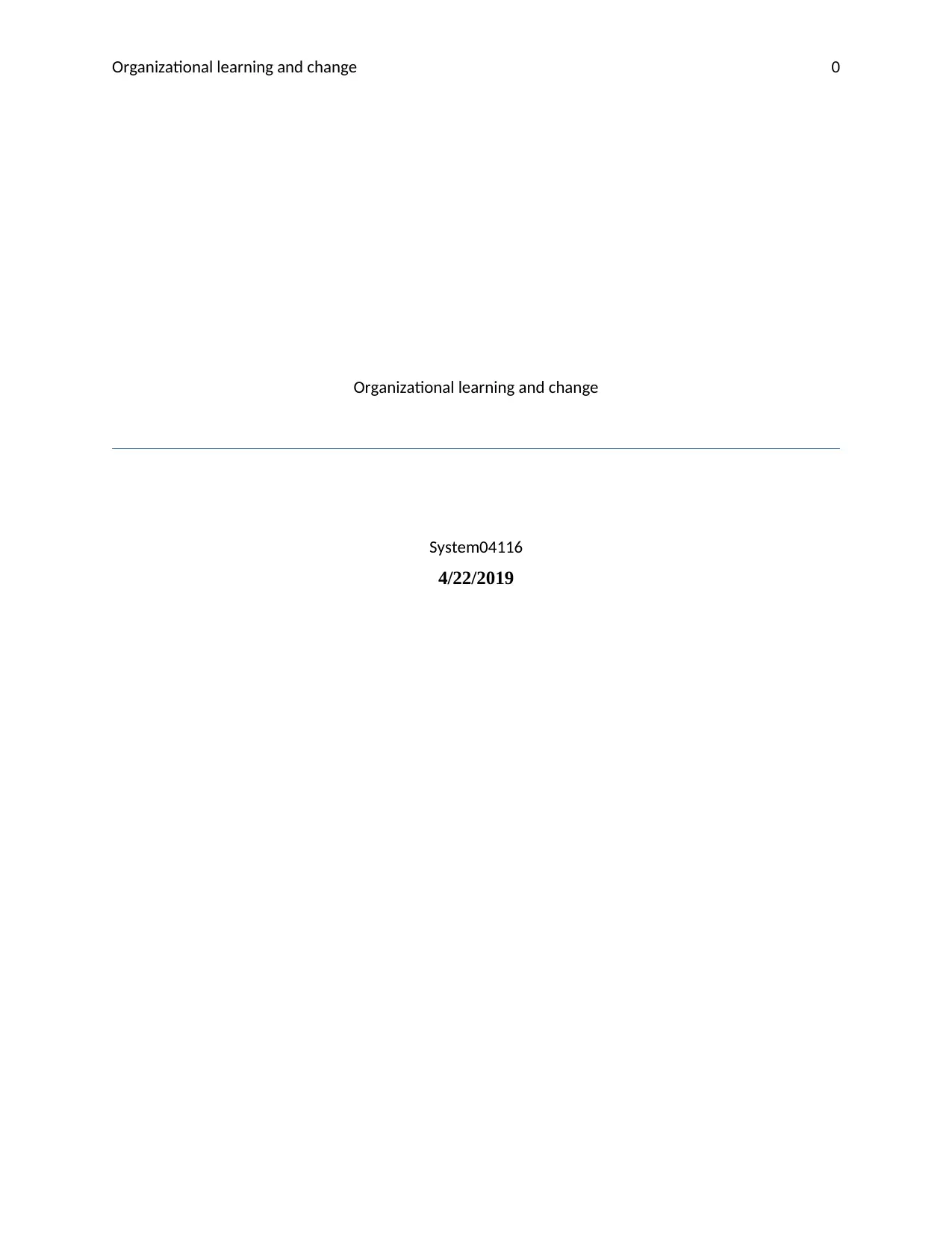
Organizational learning and change 0
Organizational learning and change
System04116
4/22/2019
Organizational learning and change
System04116
4/22/2019
Paraphrase This Document
Need a fresh take? Get an instant paraphrase of this document with our AI Paraphraser
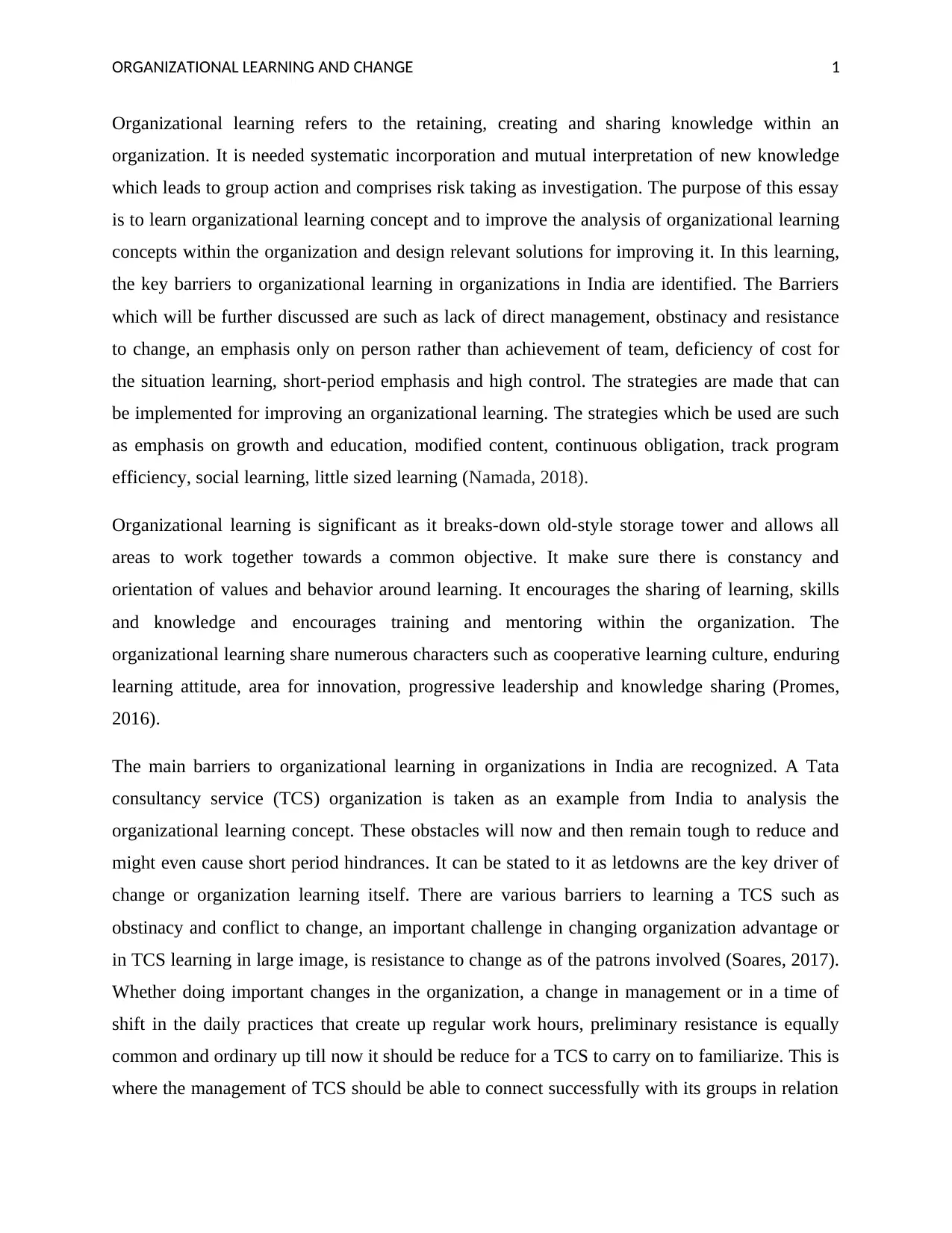
ORGANIZATIONAL LEARNING AND CHANGE 1
Organizational learning refers to the retaining, creating and sharing knowledge within an
organization. It is needed systematic incorporation and mutual interpretation of new knowledge
which leads to group action and comprises risk taking as investigation. The purpose of this essay
is to learn organizational learning concept and to improve the analysis of organizational learning
concepts within the organization and design relevant solutions for improving it. In this learning,
the key barriers to organizational learning in organizations in India are identified. The Barriers
which will be further discussed are such as lack of direct management, obstinacy and resistance
to change, an emphasis only on person rather than achievement of team, deficiency of cost for
the situation learning, short-period emphasis and high control. The strategies are made that can
be implemented for improving an organizational learning. The strategies which be used are such
as emphasis on growth and education, modified content, continuous obligation, track program
efficiency, social learning, little sized learning (Namada, 2018).
Organizational learning is significant as it breaks-down old-style storage tower and allows all
areas to work together towards a common objective. It make sure there is constancy and
orientation of values and behavior around learning. It encourages the sharing of learning, skills
and knowledge and encourages training and mentoring within the organization. The
organizational learning share numerous characters such as cooperative learning culture, enduring
learning attitude, area for innovation, progressive leadership and knowledge sharing (Promes,
2016).
The main barriers to organizational learning in organizations in India are recognized. A Tata
consultancy service (TCS) organization is taken as an example from India to analysis the
organizational learning concept. These obstacles will now and then remain tough to reduce and
might even cause short period hindrances. It can be stated to it as letdowns are the key driver of
change or organization learning itself. There are various barriers to learning a TCS such as
obstinacy and conflict to change, an important challenge in changing organization advantage or
in TCS learning in large image, is resistance to change as of the patrons involved (Soares, 2017).
Whether doing important changes in the organization, a change in management or in a time of
shift in the daily practices that create up regular work hours, preliminary resistance is equally
common and ordinary up till now it should be reduce for a TCS to carry on to familiarize. This is
where the management of TCS should be able to connect successfully with its groups in relation
Organizational learning refers to the retaining, creating and sharing knowledge within an
organization. It is needed systematic incorporation and mutual interpretation of new knowledge
which leads to group action and comprises risk taking as investigation. The purpose of this essay
is to learn organizational learning concept and to improve the analysis of organizational learning
concepts within the organization and design relevant solutions for improving it. In this learning,
the key barriers to organizational learning in organizations in India are identified. The Barriers
which will be further discussed are such as lack of direct management, obstinacy and resistance
to change, an emphasis only on person rather than achievement of team, deficiency of cost for
the situation learning, short-period emphasis and high control. The strategies are made that can
be implemented for improving an organizational learning. The strategies which be used are such
as emphasis on growth and education, modified content, continuous obligation, track program
efficiency, social learning, little sized learning (Namada, 2018).
Organizational learning is significant as it breaks-down old-style storage tower and allows all
areas to work together towards a common objective. It make sure there is constancy and
orientation of values and behavior around learning. It encourages the sharing of learning, skills
and knowledge and encourages training and mentoring within the organization. The
organizational learning share numerous characters such as cooperative learning culture, enduring
learning attitude, area for innovation, progressive leadership and knowledge sharing (Promes,
2016).
The main barriers to organizational learning in organizations in India are recognized. A Tata
consultancy service (TCS) organization is taken as an example from India to analysis the
organizational learning concept. These obstacles will now and then remain tough to reduce and
might even cause short period hindrances. It can be stated to it as letdowns are the key driver of
change or organization learning itself. There are various barriers to learning a TCS such as
obstinacy and conflict to change, an important challenge in changing organization advantage or
in TCS learning in large image, is resistance to change as of the patrons involved (Soares, 2017).
Whether doing important changes in the organization, a change in management or in a time of
shift in the daily practices that create up regular work hours, preliminary resistance is equally
common and ordinary up till now it should be reduce for a TCS to carry on to familiarize. This is
where the management of TCS should be able to connect successfully with its groups in relation
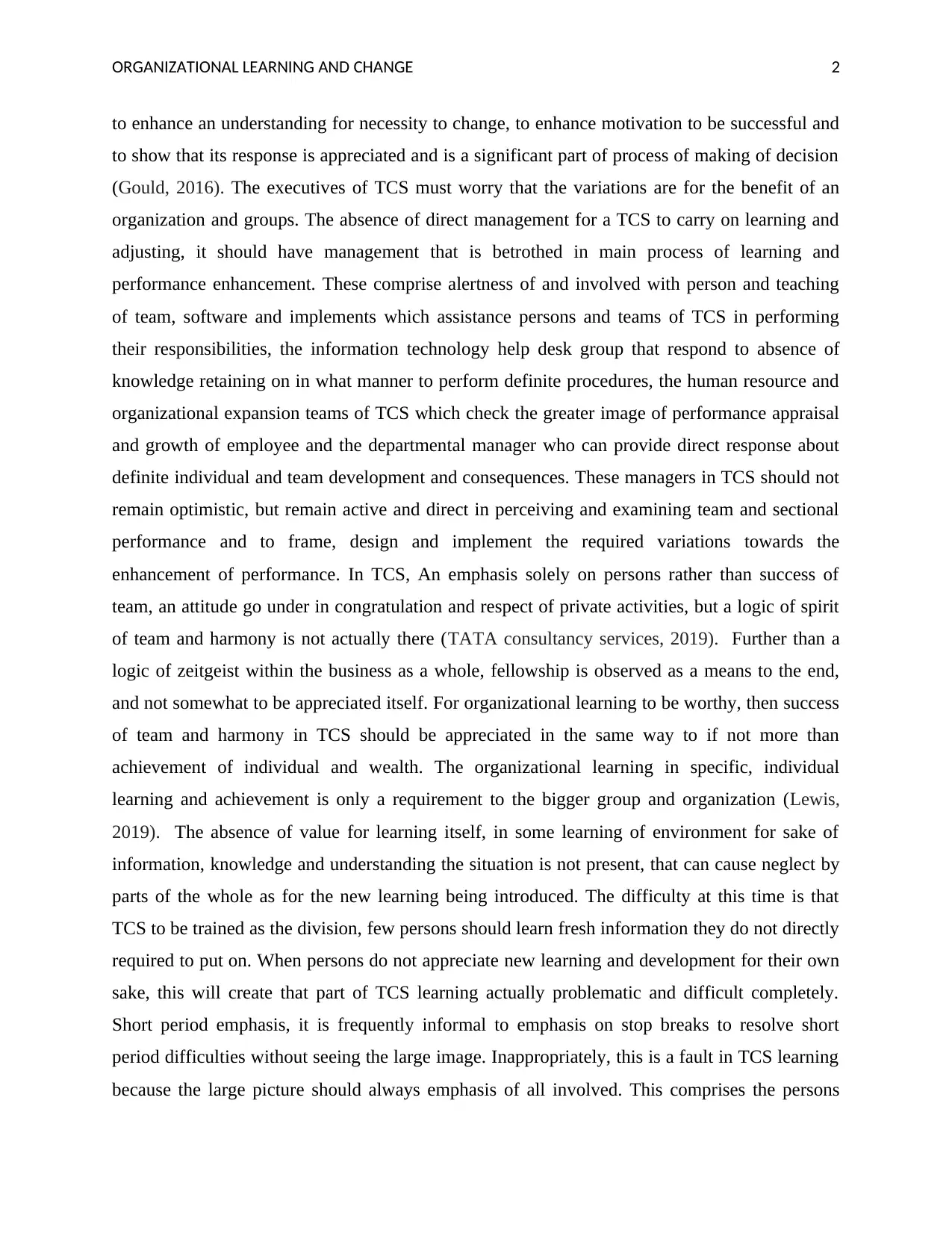
ORGANIZATIONAL LEARNING AND CHANGE 2
to enhance an understanding for necessity to change, to enhance motivation to be successful and
to show that its response is appreciated and is a significant part of process of making of decision
(Gould, 2016). The executives of TCS must worry that the variations are for the benefit of an
organization and groups. The absence of direct management for a TCS to carry on learning and
adjusting, it should have management that is betrothed in main process of learning and
performance enhancement. These comprise alertness of and involved with person and teaching
of team, software and implements which assistance persons and teams of TCS in performing
their responsibilities, the information technology help desk group that respond to absence of
knowledge retaining on in what manner to perform definite procedures, the human resource and
organizational expansion teams of TCS which check the greater image of performance appraisal
and growth of employee and the departmental manager who can provide direct response about
definite individual and team development and consequences. These managers in TCS should not
remain optimistic, but remain active and direct in perceiving and examining team and sectional
performance and to frame, design and implement the required variations towards the
enhancement of performance. In TCS, An emphasis solely on persons rather than success of
team, an attitude go under in congratulation and respect of private activities, but a logic of spirit
of team and harmony is not actually there (TATA consultancy services, 2019). Further than a
logic of zeitgeist within the business as a whole, fellowship is observed as a means to the end,
and not somewhat to be appreciated itself. For organizational learning to be worthy, then success
of team and harmony in TCS should be appreciated in the same way to if not more than
achievement of individual and wealth. The organizational learning in specific, individual
learning and achievement is only a requirement to the bigger group and organization (Lewis,
2019). The absence of value for learning itself, in some learning of environment for sake of
information, knowledge and understanding the situation is not present, that can cause neglect by
parts of the whole as for the new learning being introduced. The difficulty at this time is that
TCS to be trained as the division, few persons should learn fresh information they do not directly
required to put on. When persons do not appreciate new learning and development for their own
sake, this will create that part of TCS learning actually problematic and difficult completely.
Short period emphasis, it is frequently informal to emphasis on stop breaks to resolve short
period difficulties without seeing the large image. Inappropriately, this is a fault in TCS learning
because the large picture should always emphasis of all involved. This comprises the persons
to enhance an understanding for necessity to change, to enhance motivation to be successful and
to show that its response is appreciated and is a significant part of process of making of decision
(Gould, 2016). The executives of TCS must worry that the variations are for the benefit of an
organization and groups. The absence of direct management for a TCS to carry on learning and
adjusting, it should have management that is betrothed in main process of learning and
performance enhancement. These comprise alertness of and involved with person and teaching
of team, software and implements which assistance persons and teams of TCS in performing
their responsibilities, the information technology help desk group that respond to absence of
knowledge retaining on in what manner to perform definite procedures, the human resource and
organizational expansion teams of TCS which check the greater image of performance appraisal
and growth of employee and the departmental manager who can provide direct response about
definite individual and team development and consequences. These managers in TCS should not
remain optimistic, but remain active and direct in perceiving and examining team and sectional
performance and to frame, design and implement the required variations towards the
enhancement of performance. In TCS, An emphasis solely on persons rather than success of
team, an attitude go under in congratulation and respect of private activities, but a logic of spirit
of team and harmony is not actually there (TATA consultancy services, 2019). Further than a
logic of zeitgeist within the business as a whole, fellowship is observed as a means to the end,
and not somewhat to be appreciated itself. For organizational learning to be worthy, then success
of team and harmony in TCS should be appreciated in the same way to if not more than
achievement of individual and wealth. The organizational learning in specific, individual
learning and achievement is only a requirement to the bigger group and organization (Lewis,
2019). The absence of value for learning itself, in some learning of environment for sake of
information, knowledge and understanding the situation is not present, that can cause neglect by
parts of the whole as for the new learning being introduced. The difficulty at this time is that
TCS to be trained as the division, few persons should learn fresh information they do not directly
required to put on. When persons do not appreciate new learning and development for their own
sake, this will create that part of TCS learning actually problematic and difficult completely.
Short period emphasis, it is frequently informal to emphasis on stop breaks to resolve short
period difficulties without seeing the large image. Inappropriately, this is a fault in TCS learning
because the large picture should always emphasis of all involved. This comprises the persons
⊘ This is a preview!⊘
Do you want full access?
Subscribe today to unlock all pages.

Trusted by 1+ million students worldwide
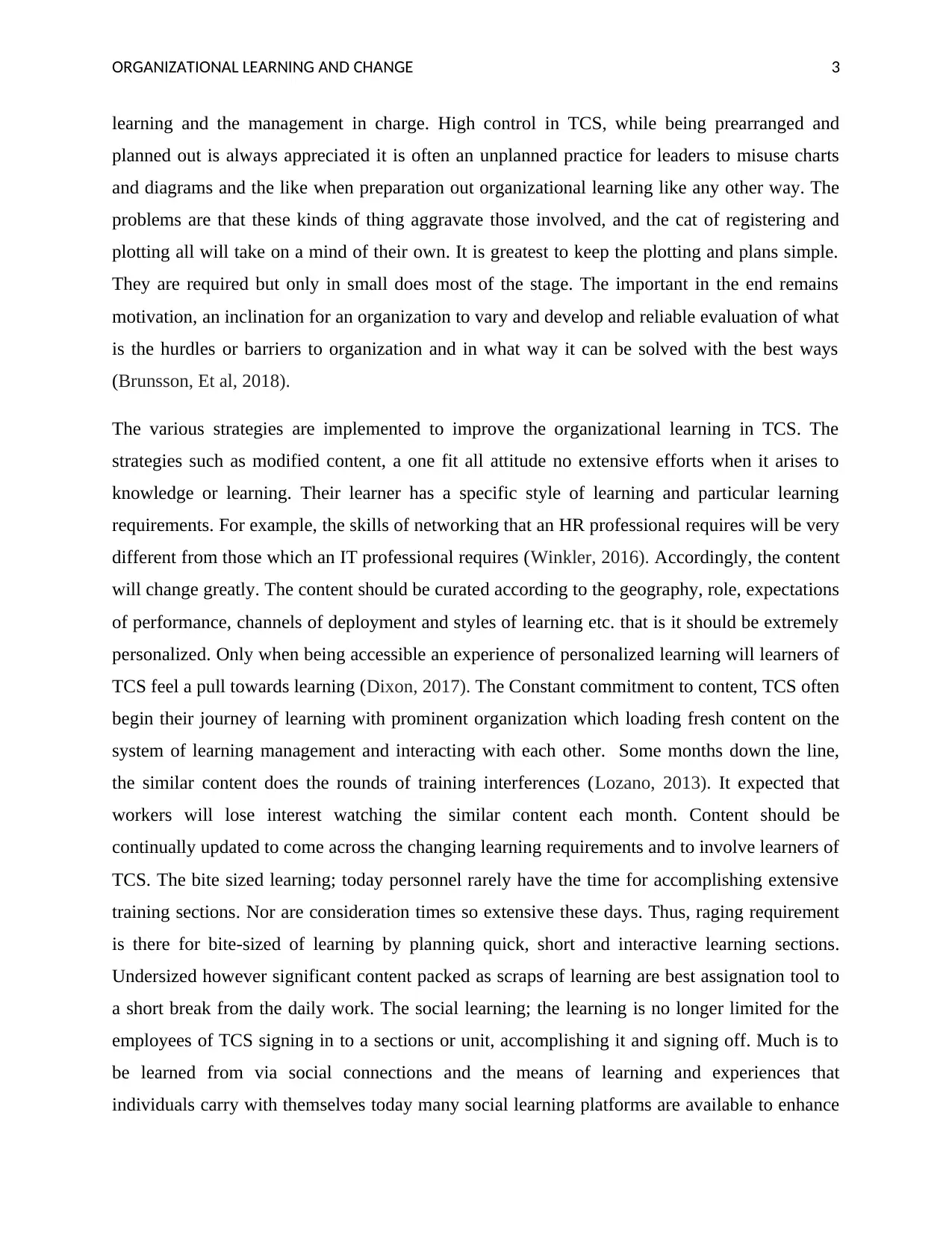
ORGANIZATIONAL LEARNING AND CHANGE 3
learning and the management in charge. High control in TCS, while being prearranged and
planned out is always appreciated it is often an unplanned practice for leaders to misuse charts
and diagrams and the like when preparation out organizational learning like any other way. The
problems are that these kinds of thing aggravate those involved, and the cat of registering and
plotting all will take on a mind of their own. It is greatest to keep the plotting and plans simple.
They are required but only in small does most of the stage. The important in the end remains
motivation, an inclination for an organization to vary and develop and reliable evaluation of what
is the hurdles or barriers to organization and in what way it can be solved with the best ways
(Brunsson, Et al, 2018).
The various strategies are implemented to improve the organizational learning in TCS. The
strategies such as modified content, a one fit all attitude no extensive efforts when it arises to
knowledge or learning. Their learner has a specific style of learning and particular learning
requirements. For example, the skills of networking that an HR professional requires will be very
different from those which an IT professional requires (Winkler, 2016). Accordingly, the content
will change greatly. The content should be curated according to the geography, role, expectations
of performance, channels of deployment and styles of learning etc. that is it should be extremely
personalized. Only when being accessible an experience of personalized learning will learners of
TCS feel a pull towards learning (Dixon, 2017). The Constant commitment to content, TCS often
begin their journey of learning with prominent organization which loading fresh content on the
system of learning management and interacting with each other. Some months down the line,
the similar content does the rounds of training interferences (Lozano, 2013). It expected that
workers will lose interest watching the similar content each month. Content should be
continually updated to come across the changing learning requirements and to involve learners of
TCS. The bite sized learning; today personnel rarely have the time for accomplishing extensive
training sections. Nor are consideration times so extensive these days. Thus, raging requirement
is there for bite-sized of learning by planning quick, short and interactive learning sections.
Undersized however significant content packed as scraps of learning are best assignation tool to
a short break from the daily work. The social learning; the learning is no longer limited for the
employees of TCS signing in to a sections or unit, accomplishing it and signing off. Much is to
be learned from via social connections and the means of learning and experiences that
individuals carry with themselves today many social learning platforms are available to enhance
learning and the management in charge. High control in TCS, while being prearranged and
planned out is always appreciated it is often an unplanned practice for leaders to misuse charts
and diagrams and the like when preparation out organizational learning like any other way. The
problems are that these kinds of thing aggravate those involved, and the cat of registering and
plotting all will take on a mind of their own. It is greatest to keep the plotting and plans simple.
They are required but only in small does most of the stage. The important in the end remains
motivation, an inclination for an organization to vary and develop and reliable evaluation of what
is the hurdles or barriers to organization and in what way it can be solved with the best ways
(Brunsson, Et al, 2018).
The various strategies are implemented to improve the organizational learning in TCS. The
strategies such as modified content, a one fit all attitude no extensive efforts when it arises to
knowledge or learning. Their learner has a specific style of learning and particular learning
requirements. For example, the skills of networking that an HR professional requires will be very
different from those which an IT professional requires (Winkler, 2016). Accordingly, the content
will change greatly. The content should be curated according to the geography, role, expectations
of performance, channels of deployment and styles of learning etc. that is it should be extremely
personalized. Only when being accessible an experience of personalized learning will learners of
TCS feel a pull towards learning (Dixon, 2017). The Constant commitment to content, TCS often
begin their journey of learning with prominent organization which loading fresh content on the
system of learning management and interacting with each other. Some months down the line,
the similar content does the rounds of training interferences (Lozano, 2013). It expected that
workers will lose interest watching the similar content each month. Content should be
continually updated to come across the changing learning requirements and to involve learners of
TCS. The bite sized learning; today personnel rarely have the time for accomplishing extensive
training sections. Nor are consideration times so extensive these days. Thus, raging requirement
is there for bite-sized of learning by planning quick, short and interactive learning sections.
Undersized however significant content packed as scraps of learning are best assignation tool to
a short break from the daily work. The social learning; the learning is no longer limited for the
employees of TCS signing in to a sections or unit, accomplishing it and signing off. Much is to
be learned from via social connections and the means of learning and experiences that
individuals carry with themselves today many social learning platforms are available to enhance
Paraphrase This Document
Need a fresh take? Get an instant paraphrase of this document with our AI Paraphraser
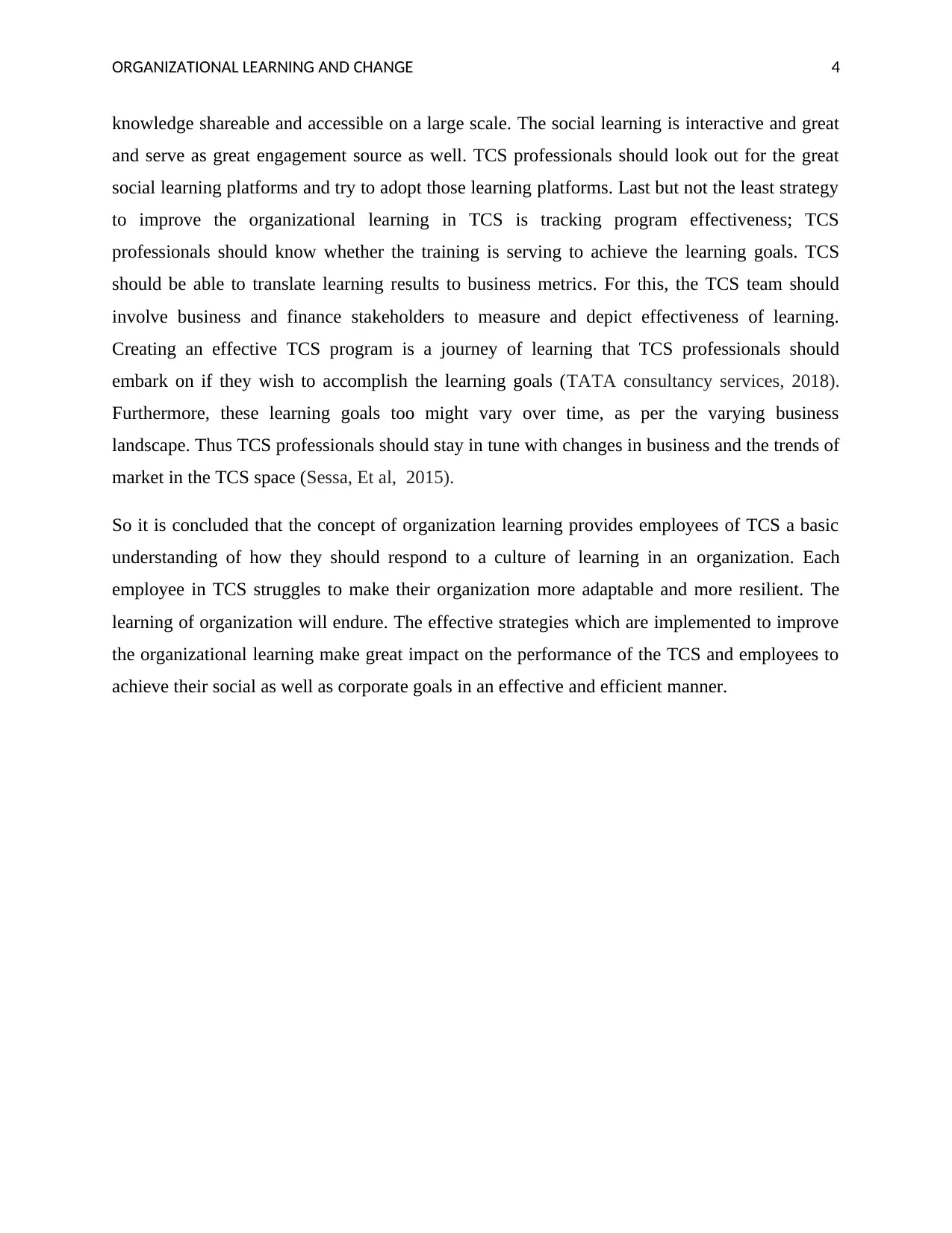
ORGANIZATIONAL LEARNING AND CHANGE 4
knowledge shareable and accessible on a large scale. The social learning is interactive and great
and serve as great engagement source as well. TCS professionals should look out for the great
social learning platforms and try to adopt those learning platforms. Last but not the least strategy
to improve the organizational learning in TCS is tracking program effectiveness; TCS
professionals should know whether the training is serving to achieve the learning goals. TCS
should be able to translate learning results to business metrics. For this, the TCS team should
involve business and finance stakeholders to measure and depict effectiveness of learning.
Creating an effective TCS program is a journey of learning that TCS professionals should
embark on if they wish to accomplish the learning goals (TATA consultancy services, 2018).
Furthermore, these learning goals too might vary over time, as per the varying business
landscape. Thus TCS professionals should stay in tune with changes in business and the trends of
market in the TCS space (Sessa, Et al, 2015).
So it is concluded that the concept of organization learning provides employees of TCS a basic
understanding of how they should respond to a culture of learning in an organization. Each
employee in TCS struggles to make their organization more adaptable and more resilient. The
learning of organization will endure. The effective strategies which are implemented to improve
the organizational learning make great impact on the performance of the TCS and employees to
achieve their social as well as corporate goals in an effective and efficient manner.
knowledge shareable and accessible on a large scale. The social learning is interactive and great
and serve as great engagement source as well. TCS professionals should look out for the great
social learning platforms and try to adopt those learning platforms. Last but not the least strategy
to improve the organizational learning in TCS is tracking program effectiveness; TCS
professionals should know whether the training is serving to achieve the learning goals. TCS
should be able to translate learning results to business metrics. For this, the TCS team should
involve business and finance stakeholders to measure and depict effectiveness of learning.
Creating an effective TCS program is a journey of learning that TCS professionals should
embark on if they wish to accomplish the learning goals (TATA consultancy services, 2018).
Furthermore, these learning goals too might vary over time, as per the varying business
landscape. Thus TCS professionals should stay in tune with changes in business and the trends of
market in the TCS space (Sessa, Et al, 2015).
So it is concluded that the concept of organization learning provides employees of TCS a basic
understanding of how they should respond to a culture of learning in an organization. Each
employee in TCS struggles to make their organization more adaptable and more resilient. The
learning of organization will endure. The effective strategies which are implemented to improve
the organizational learning make great impact on the performance of the TCS and employees to
achieve their social as well as corporate goals in an effective and efficient manner.
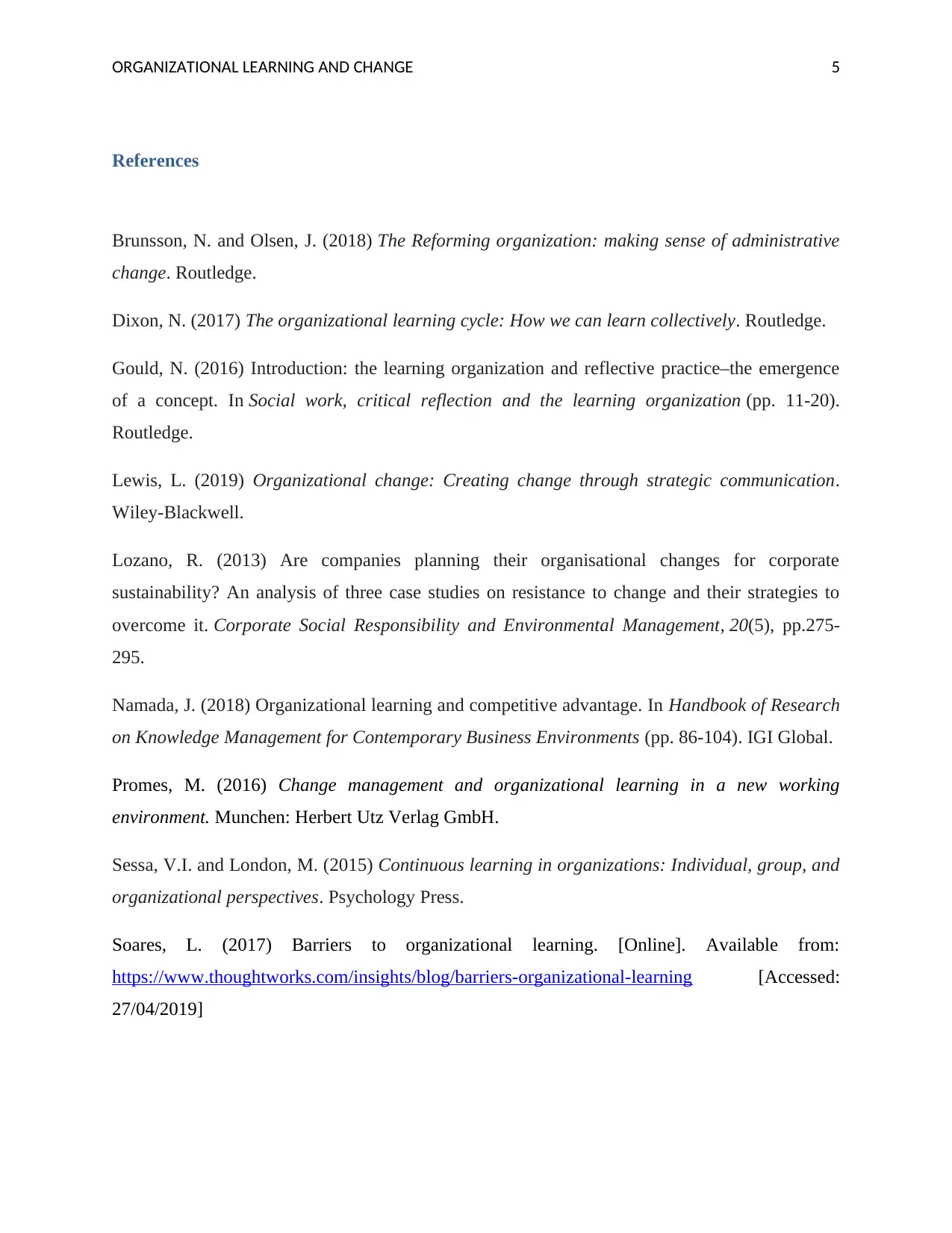
ORGANIZATIONAL LEARNING AND CHANGE 5
References
Brunsson, N. and Olsen, J. (2018) The Reforming organization: making sense of administrative
change. Routledge.
Dixon, N. (2017) The organizational learning cycle: How we can learn collectively. Routledge.
Gould, N. (2016) Introduction: the learning organization and reflective practice–the emergence
of a concept. In Social work, critical reflection and the learning organization (pp. 11-20).
Routledge.
Lewis, L. (2019) Organizational change: Creating change through strategic communication.
Wiley-Blackwell.
Lozano, R. (2013) Are companies planning their organisational changes for corporate
sustainability? An analysis of three case studies on resistance to change and their strategies to
overcome it. Corporate Social Responsibility and Environmental Management, 20(5), pp.275-
295.
Namada, J. (2018) Organizational learning and competitive advantage. In Handbook of Research
on Knowledge Management for Contemporary Business Environments (pp. 86-104). IGI Global.
Promes, M. (2016) Change management and organizational learning in a new working
environment. Munchen: Herbert Utz Verlag GmbH.
Sessa, V.I. and London, M. (2015) Continuous learning in organizations: Individual, group, and
organizational perspectives. Psychology Press.
Soares, L. (2017) Barriers to organizational learning. [Online]. Available from:
https://www.thoughtworks.com/insights/blog/barriers-organizational-learning [Accessed:
27/04/2019]
References
Brunsson, N. and Olsen, J. (2018) The Reforming organization: making sense of administrative
change. Routledge.
Dixon, N. (2017) The organizational learning cycle: How we can learn collectively. Routledge.
Gould, N. (2016) Introduction: the learning organization and reflective practice–the emergence
of a concept. In Social work, critical reflection and the learning organization (pp. 11-20).
Routledge.
Lewis, L. (2019) Organizational change: Creating change through strategic communication.
Wiley-Blackwell.
Lozano, R. (2013) Are companies planning their organisational changes for corporate
sustainability? An analysis of three case studies on resistance to change and their strategies to
overcome it. Corporate Social Responsibility and Environmental Management, 20(5), pp.275-
295.
Namada, J. (2018) Organizational learning and competitive advantage. In Handbook of Research
on Knowledge Management for Contemporary Business Environments (pp. 86-104). IGI Global.
Promes, M. (2016) Change management and organizational learning in a new working
environment. Munchen: Herbert Utz Verlag GmbH.
Sessa, V.I. and London, M. (2015) Continuous learning in organizations: Individual, group, and
organizational perspectives. Psychology Press.
Soares, L. (2017) Barriers to organizational learning. [Online]. Available from:
https://www.thoughtworks.com/insights/blog/barriers-organizational-learning [Accessed:
27/04/2019]
⊘ This is a preview!⊘
Do you want full access?
Subscribe today to unlock all pages.

Trusted by 1+ million students worldwide
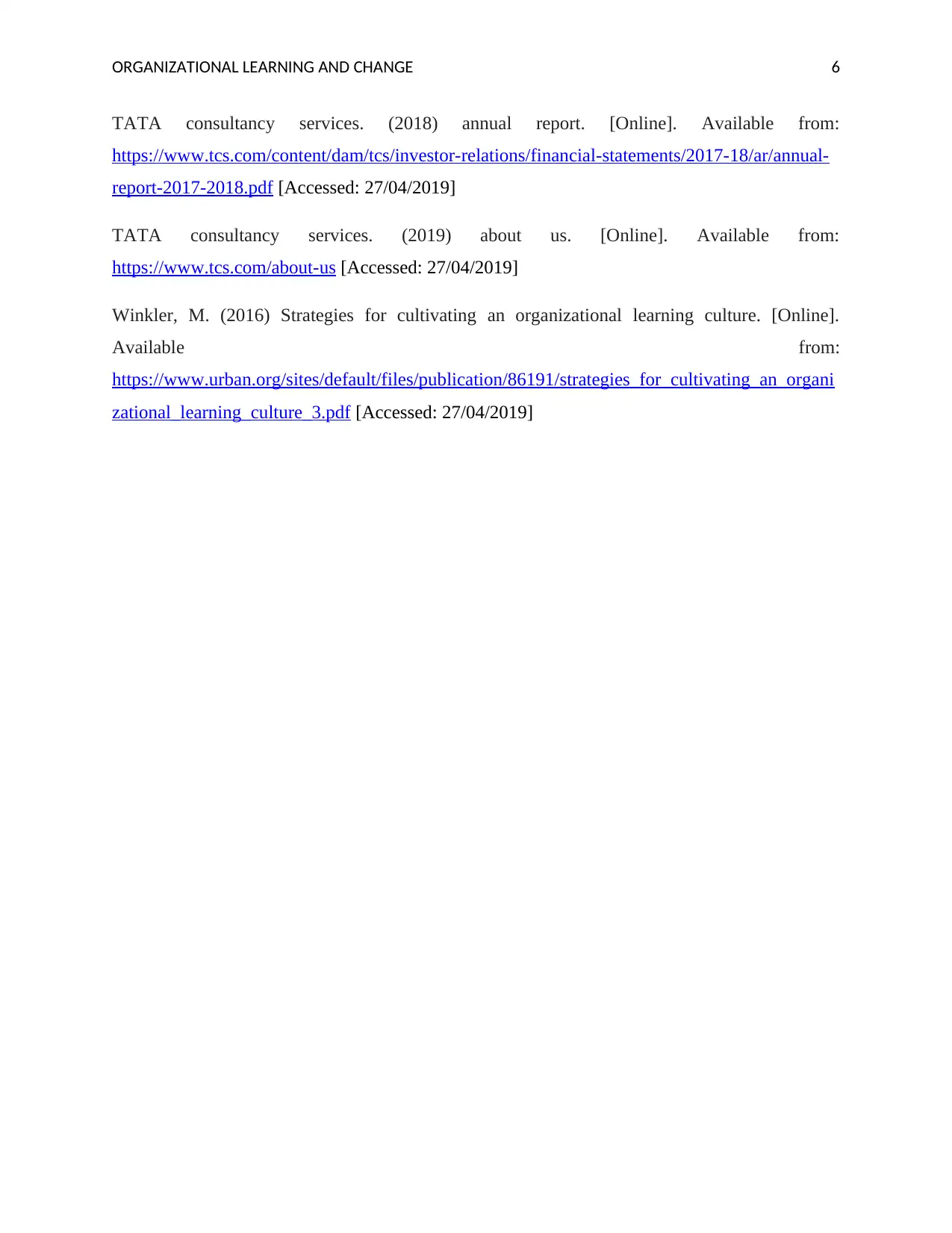
ORGANIZATIONAL LEARNING AND CHANGE 6
TATA consultancy services. (2018) annual report. [Online]. Available from:
https://www.tcs.com/content/dam/tcs/investor-relations/financial-statements/2017-18/ar/annual-
report-2017-2018.pdf [Accessed: 27/04/2019]
TATA consultancy services. (2019) about us. [Online]. Available from:
https://www.tcs.com/about-us [Accessed: 27/04/2019]
Winkler, M. (2016) Strategies for cultivating an organizational learning culture. [Online].
Available from:
https://www.urban.org/sites/default/files/publication/86191/strategies_for_cultivating_an_organi
zational_learning_culture_3.pdf [Accessed: 27/04/2019]
TATA consultancy services. (2018) annual report. [Online]. Available from:
https://www.tcs.com/content/dam/tcs/investor-relations/financial-statements/2017-18/ar/annual-
report-2017-2018.pdf [Accessed: 27/04/2019]
TATA consultancy services. (2019) about us. [Online]. Available from:
https://www.tcs.com/about-us [Accessed: 27/04/2019]
Winkler, M. (2016) Strategies for cultivating an organizational learning culture. [Online].
Available from:
https://www.urban.org/sites/default/files/publication/86191/strategies_for_cultivating_an_organi
zational_learning_culture_3.pdf [Accessed: 27/04/2019]
1 out of 7
Related Documents
Your All-in-One AI-Powered Toolkit for Academic Success.
+13062052269
info@desklib.com
Available 24*7 on WhatsApp / Email
![[object Object]](/_next/static/media/star-bottom.7253800d.svg)
Unlock your academic potential
Copyright © 2020–2026 A2Z Services. All Rights Reserved. Developed and managed by ZUCOL.





